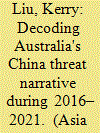|
|
|
Sort Order |
|
|
|
Items / Page
|
|
|
|
|
|
|
| Srl | Item |
| 1 |
ID:
191115


|
|
|
|
|
| Summary/Abstract |
Australia–China relations began to sour in 2016, and the China threat narrative began to dominate since then. Unlike previous studies which either use a qualitative approach or cross-sectional dataset for empirical analysis, this study creatively creates high-frequency weekly and monthly time series datasets using the Google Trends search results during January 2016–February 2021. Based on a series of time series modellings, this study examines the roles of various actors, including China's own policies, the Australian Strategic Policy Institute and Clive Hamilton, various factors, including Chinese purchase of Australian housing, Chinese investment in Australia, Chinese students in Australia and China's rise and various media outlets, including the Australian Broadcasting Corporation, Australian Financial Review, Sydney Morning Herald, Daily Telegraph and Herald Sun, in contributing to Australia's China threat narrative. This study makes significant contributions to academia in methods by bringing a new quantitative approach to international relations studies and to policy-makers as well by quantifying the roles of various actors, factors and media outlets in Australia's China policy debate.
|
|
|
|
|
|
|
|
|
|
|
|
|
|
|
|
| 2 |
ID:
104986


|
|
|
|
|
| Publication |
2011.
|
| Summary/Abstract |
Since 2005, a burgeoning wave of Chinese investments has set off a new 'minerals boom' in the Australian iron ore and coal mining sectors. While normally a welcome development, the state-owned and strategic nature of the investors has raised concerns in Australia about how these should be regulated. As a result, in February 2008 the Australian government declared an intention to more closely screen foreign direct investment (FDI) from state-owned sources, which both supporters and detractors alike have claimed is evidence of 'resource nationalism' in Australia's approach towards its trade and investment relationships with China. This article challenges this understanding through an examination of the characteristics of Chinese mining FDI, the dilemmas these present to the Australian government, and the relatively restrained nature of its response. Through this, Australia's FDI policy is explained as a defensive move against the potential for strategic behaviour by Chinese investors resulting from their state ownership, rather than any national program to subject minerals trade and investment to political control. On this basis, the article argues that Australian government policy instead evidences a 'resource liberalism' approach, which intends to ensure that the governance of Australia's minerals trade and investment with China remain market-based processes.
|
|
|
|
|
|
|
|
|
|
|
|
|
|
|
|
|
|
|
|
|